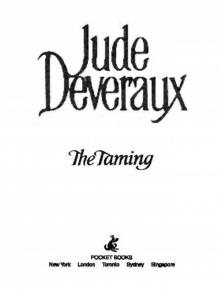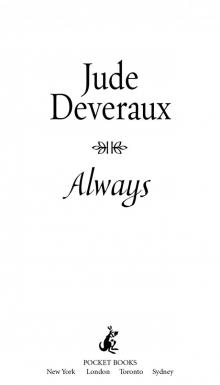- Home
- Jude Deveraux
Eternity Page 6
Eternity Read online
Page 6
Carrie watched as the children hugged their father, kissed his cheek, and told him good night, then both of them turned to Carrie and didn’t seem to know what to do.
She smiled. “Go on, go to bed,” she said, still smiling and relieving them of their dilemma.
As she watched, they scurried up a ladder leaning against the wall in the shadow of the fireplace. Overhead, she could hear them in what must be a tiny attic as they settled down for bed.
Still smiling, Carrie looked back at Josh, but he wasn’t smiling. All humor, all happiness had left his handsome face, and his dour expression made the smile disappear from her face.
“I’ll clean this up,” Carrie said.
“Unless you plan to leave it for the maid.”
Her teeth gritted, she stopped with her hands on the handkerchiefs. “What is it that angers you the most about me? Is it that I have so far succeeded where you predicted failure?”
Sitting down on the chair, her hands clutched in front of her, she looked at him. “I can see now that what I did wasn’t fair to you or your children, but I think you should give me a chance. I think you’ve misjudged me.”
For a moment she saw that look of desire in his eyes, and the hairs on the back of her neck stood up, but then it was gone again and he looked at her coldly. “Let me explain something to you, Miss Montgomery, I—” He put his hand up when she started to speak. “All right, then, Mrs. Greene. My children mean more to me than anything else in the world. They mean everything to me, and I want to give them the best that I can, and by the best I mean a life that has a great deal of stability to it. I want them to have a father and a mother as well. I want them to have what I didn’t have, and I want them to grow up in the country in the fresh air; I want them to have food—home-cooked food. In order to obtain those things for my children, I am willing to do anything I have to. If I have to marry a woman who is part horse in order to give them what they need, then I’ll do so. Do you understand me?”
“What about love?” Carrie asked softly. “Doesn’t love matter to you?”
When he answered, he didn’t meet her eyes. “I love them enough for a dozen people. What they need is good food and a clean house and clean clothes.”
“I see. And you have decided that I can’t give them any of those things. You’ve known me for only a few hours, yet you’ve decided exactly what I’m like.”
He smiled at her in a patronizing way. “Look at you. How much did that dress cost you, and are those real pearls you’re wearing? You don’t have to answer me. I unloaded your trunks, remember? Do you think I’m so stupid as to think that someone like you is going to be happy living in this…” He waved his hand. “This hovel?” He leaned toward her, the table width between them. “You know what I think, Miss Montgomery? And yes it is and will always be Miss Montgomery, because I don’t mean to actually make you into Mrs. Greene, if you know what I mean.”
Carrie couldn’t help herself, but she glanced toward the bedroom, which she hadn’t yet seen.
“Exactly,” Josh said. “What I think is that this is a great adventure to you. You probably grew up spoiled and pampered by these too-magnificent-to-be-believed brothers of yours and you think you can do anything you want. Right now you want to spread your cheery little self around the house of some poor man and his children. But what happens to us after you get tired of us? Do you come into our lives, make us laugh with your stories, make the children and—” He sighed. “Make the children come to love you, and for that matter, maybe make me come to adore you, too, then when you’re tired of us, you go back to Daddy and your fascinating brothers? Is that what’s going to happen?”
“No,” she said and started to defend herself, but he wouldn’t let her speak.
“How old are you, Miss Montgomery? Eighteen? Nineteen? Twenty, at most, is my guess.”
Carrie didn’t answer him, for he seemed to have everything figured out, so why bother trying to dissuade him?
“You haven’t had time to see anything of the world or to experience anything. Quite romantically, you fell in love with a photograph, and you thought you’d give marriage a try. How exciting to travel all the way out West with hundreds of dresses and—”
Abruptly, he broke off and stood up. “What the hell’s the use trying to explain? You’d never understand in a million years.” He gave a sigh of resignation. “All right, Miss Montgomery, here’s the way it’s going to be. You may stay here for one week—until the stage travels through again—then I’m sending you back to your father as intact as you were when you arrived. You were so clever at arranging this marriage all by yourself, so you can arrange the annulment all by yourself.”
Carrie stood up also. “Are you through? Have you finished insulting both me and my family? Maybe I should tell you about the town where I grew up so you can insult that too. It’s true that I grew up with money, but as far as I know you don’t have to be poor in order to want to give and receive love. And whether you believe me or not, love is why I came to this place. I—” She stopped because if she didn’t, she was going to start crying. When she thought of all her expectations and the reality of meeting the man she thought she was going to love, she could do little else except cry.
With all the dignity she could muster, she picked up her night case, tucked her dog under her arm, and walked toward the bedroom. “I shall stay here one week, Mr. Greene, not because of you, but because those children of yours need a little happiness in their lives, and if I can give them one week of happiness, that’s better than nothing. At the end of the week I shall return to my father just as you wish.” She took a step into the bedroom, her hand on the door. “As for your not touching me during that week, that is your loss.” With that she slammed the door.
She managed to maintain her anger for about three minutes, then she flung herself on the none-too-clean bed and began to cry. Choo-choo licked her face and seemed as sad as she was.
Chapter Five
The next morning, Carrie was out of bed before dawn—or at least it seemed so to her. Usually, she awoke early, but she had a talent for turning over and going back to sleep, but this morning it took her a moment to remember where she was. Her eyes were puffy from crying herself to sleep, and she had a bit of a headache.
Reluctantly, she got out of the warm bed, opened the bedroom door, and went into the parlor—if it could be called that—and smiled when she saw that it was empty. Good, she thought, she was up before they were. But then she saw that there was a note on the table. They couldn’t have come and gone already, could they? It was barely dawn.
Ignoring the note, she turned back to the bedroom, trying not to look at the dreariness of the little room. A bureau that didn’t look as though it would make good firewood was against one wall and on top of it was a pocket watch that she assumed was Josh’s. Squinting against the early morning light, she looked at the watch. Eight o’clock. Good heavens, she had never been out of bed this early in her life. Even when she was going to school, her tutor had started her classes at eleven.
Yawning, she went back into the big room and picked up the paper from the table. Recognizing Josh’s handwriting, she was instantly transported back to the time in Maine when she had read and reread his letter asking for a wife, and later she had memorized his letter saying he agreed to her terms of a proxy marriage.
Sitting down, Choo-choo on her lap, she read Josh’s letter.
Dear Miss Montgomery:
I didn’t sleep much last night as I was thinking about our few conversations—if you can call them that. Whatever has happened, I believe you meant well. I now believe that your intentions were good and maybe there’s some truth in my children needing more than just clean clothes and hot food. But whatever your intentions, my children do need those things.
Twice you have asked me to give you a chance to prove yourself, to allow you to show me that you are not what you appear to be, so I have decided to give you that chance. You have proven yourself to be capabl
e of caring for my children in a maternal way—at breakfast they could hardly keep their eyes off the bedroom door. In fairness to you, you seem to genuinely like my children, but I wonder if you can do the chores necessary to be a farmer’s wife.
I am enclosing a list of chores that I will expect you to complete within the week that you are to be with us. If you can do these things, then I am willing to discuss what possible future there is for you as the mother of my children.
Sincerely yours,
Joshua T. Greene
After reading the letter, Carrie picked up the list of chores, her mouth dropping open when she saw that the list was at least a foot long. Five women in six weeks couldn’t complete all the things that Josh had given her to do.
She sat back in the chair, her eyes narrowed at the list in one hand and the letter in the other. “You will allow me to be the mother of your children, will you?” she said to the air. “Not your wife, but somebody’s mother.” Tossing the papers aside, she scratched Choo-choo’s head. “Rumpelstiltskin. That’s what this is like. King Joshua gives me a list of chores just as the king in the fairy tale gave the young woman a roomful of straw to spin into gold. If she performed that impossible task, then she got to marry the king. In this case I get to mother the king’s children.”
She looked about the room. Impossible to believe, but it looked even more barren and hopeless in the daylight than it had the previous evening. “I wonder what they had for breakfast? Peas?” Carrie gave a delicate shudder, then stood and put Choo-choo to the floor. “Shall we go find our own Rumpelstiltskin?” she said to the dog. “Someone to help us perform the tasks the king has set before us?”
An hour later when Mrs. Carrie Greene née Montgomery rode into the town of Eternity on Josh Greene’s old swayback workhorse wearing the finest riding habit that had ever been seen west of the Mississippi, the town came to a virtual standstill. Every person in sight stopped what he or she was doing and looked at this vision of loveliness. Her habit was dark red, trimmed in black velvet, and she wore the sauciest little veiled hat perched over one eye that anyone had ever seen.
“Good morning,” Carrie said to each person she passed. “Good morning.”
People stared and nodded at this fashion plate vision of loveliness, too dumbfounded to move or reply.
Carrie stopped the horse—if the poor thing could be called that—in front of the mercantile store, where the owner had paused in sweeping the front porch to gape at her. Nodding to him, she said, “Good morning,” then went inside the cool, dark store.
When the store owner had recovered himself, he leaned his broom against the wall, smoothed his apron front, and went into the store.
Carrie had seated herself on a chair near the empty wood stove and was removing her riding gloves.
“What can I do for you, Miss, ah…”
“Mrs. Greene,” she said confidently. “Mrs. Joshua Greene.”
“I didn’t know Josh got married. Hiram didn’t tell me anything about it.”
That was the second time Carrie had heard mention of Hiram, and she had no idea who he was, but she wasn’t going to let this man know that. “It was rather sudden,” she said demurely, trying to make it seem as though she and Josh hadn’t been able to help themselves, that their marriage had been a love match.
“I understand,” the store owner said. “Now, what may I do for you?”
By this time a quarter of the townspeople had decided that they had to buy something at the mercantile store and so had slipped through the door as quietly as possible. They were lining up against the wall opposite Carrie, standing quietly, looking at her as they would have a circus performer.
“I should like to make a few purchases,” Carrie said.
Carrie knew that Josh thought she had no talents because she didn’t know how to wash dishes or open cans, but there was a talent that Carrie had in abundance and that was: She knew how to buy things. That statement might cause laughter in some people, but the ability to use money properly is an underestimated talent. Some people with great wealth squander their money on bad investments; they hire incompetent people; if they buy art, they buy fakes.
But Carrie knew how to handle money. She knew how to get ten cents out of every nickel. There was a joke in her hometown that it was better to work for any Montgomery other than Carrie, for she’d get twice as much work out of you for half as much money. Carrie had a way of looking at people with her big blue eyes that made them fall over themselves to do what she wanted.
“I wonder if someone in this lovely town could help me,” she said innocently. “My husband has asked me to do a few things for him, and I really don’t know how to get started.”
When she held up the list of tasks Josh had written out for her, the store owner looked at it, then gave a long, low whistle and passed the list to the man behind him, who passed it to the person beside him.
“Why, you poor thing,” one woman said upon reading the list. “What in the world was Josh thinkin’ of?”
Carrie sighed. “I am a brand-new wife and have no idea how to do anything. I don’t even know how to open a can.”
“I’d like to show her how to open a can,” one man mumbled, but his wife poked him in the ribs.
“I may not be able to actually do the things my husband wants, but I thought perhaps I could get someone to help me.”
They were willing to give lots of sympathy, but no one rushed forward to volunteer to repair the roof on that shack of Josh’s. Compassion was one thing but sweat was another.
Carrie removed the fat purse from her wrist. “My father gave me a bit of money before I left home so I wondered if I could hire some people to help me.” She opened the drawstring and poured several coins into her pretty little palm. “Does it matter that the only coins I have are gold?”
After the initial intake of breath, all hell broke loose as people began shoving, kicking, and shouting as they offered Carrie their services to do anything that she wanted them to do. They were her slaves—or perhaps highly paid employees would be more accurate.
Standing up, Carrie went to work. She was a sweet-voiced drill sergeant, but a drill sergeant nonetheless. First, she hired half a dozen women to clean that pigsty Josh called a house, then she bargained with two other women to take Josh’s chipped and cracked dirty dishes away in trade for three rose bushes that grew in front of their own houses. Planting was part of the trade.
She bought home-canned goods from nearly every woman in town (all of whom were in the store by now), and she purchased produce from gardens. For the future, she arranged with a woman named Mrs. Emmerling to cook meals and deliver them to Josh’s house every other day, paying for a month in advance.
When she was finished with the women, she started on the men. She arranged for the roof to be repaired and the shed to be mended, then hired a carpenter to repair the front door. When she asked if anyone had a porch on his or her house, a porch that they’d like to take down and put up on the front of Josh’s house, there was a bidding war on the porch. Carrie went with the man who had the porch with the white posts. She arranged for the house to be painted.
“How soon do you want this done?” one man asked.
Carrie smiled sweetly. “For every job that’s done by sundown tonight, I will pay twelve percent more than the agreed-upon price.”
About twenty people tried to get out the door at the same time.
“Now,” Carrie said, turning back to the store owner. “I’d like to make a few purchases.”
She bought one can of everything he had in his store. She bought bacon and ham and flour, as well as anything the store owner’s wife told her she’d “need” as a wife. Smiling as though she knew what she was doing, Carrie purchased a can opener, a strange-looking contraption that made no sense to her. She purchased a cookstove that the store owner said anyone could cook on.
She bought lace curtains and panes of glass, then hired people to install them.
By this
time people were running into the store and offering Carrie things to buy, for Eternity was a poor town, and people used any opportunity to earn money. Carrie bought rag rugs, more rose bushes, a solid oak kitchen cabinet, four matching chairs (she traded Josh’s chairs for these), quilts, blankets, pillows, and sheets. She bought dishes and silverware (plate, unfortunately, not sterling) from a widower, and she hired women to come once a week and do the laundry.
When a wagon full of furniture came rolling by, owned by a family moving out of Eternity, she bought several pieces, including a big tin bathtub.
By two o’clock she rode out of what was nearly a deserted town, for most of the townspeople were already at Josh’s house working, but two big, strong boys came running up and asked what they could do. Carrie hired them to go into the mountains, dig up four sapling trees, and plant them in Josh’s front yard.
By three she was back at Josh’s house. A circus would have seemed calmer than the chaos around his house, as women tried to plant roses right where men wanted to stand while they painted. Women stole ladders from men fixing the roof, then the painters stole the ladders back. Tempers were short, and there was a great deal of shouting while everyone tried to get his or her job done before the sundown deadline.
Carrie sat on the sidelines, eating bread and butter, feeding tidbits of this and that to Choo-choo, and paying men and women as they finished their jobs. She didn’t have to worry about quality of work, for the people were glad enough to report any task that was only half done.
It was summer, so, thankfully, sundown was late in coming, and by the time there was a reddish glow on the horizon, the house was unrecognizable. Smoke poured from the repaired chimney, and over the stench of fresh paint, she could smell roast beef and possibly carrots simmering.
It was almost dark and, thankfully, there was still no sign of Josh or the kids yet when the last tired woman left the house, her money clasped in her hand. Carrie left her place under the shade tree and went back to the house, knowing that what she most wanted was a long, hot bath. She certainly deserved one after the day of work she had done. Having anticipated this need, she had arranged for several buckets of hot water to be waiting by the tub set up in the bedroom, so all she had to do was undress herself—a task in itself, considering all the buttons on her habit—and step into the water.

 Eternity
Eternity The Temptress
The Temptress The Taming
The Taming True Love
True Love Forever...
Forever... Lavender Morning
Lavender Morning The Velvet Promise
The Velvet Promise Days of Gold
Days of Gold Temptation
Temptation Counterfeit Lady
Counterfeit Lady Twin of Fire
Twin of Fire Remembrance
Remembrance Velvet Angel
Velvet Angel The Enchanted Land
The Enchanted Land Just Curious
Just Curious Wild Orchids
Wild Orchids First Impressions
First Impressions Wishes
Wishes Twin of Ice
Twin of Ice Ever After
Ever After An Angel for Emily
An Angel for Emily River Lady
River Lady The Invitation
The Invitation Scarlet Nights
Scarlet Nights The Black Lyon
The Black Lyon High Tide
High Tide The Girl From Summer Hill
The Girl From Summer Hill Sweetbriar
Sweetbriar As You Wish
As You Wish For All Time
For All Time Secrets
Secrets The Blessing
The Blessing Upon a Midnight Clear
Upon a Midnight Clear The Mulberry Tree
The Mulberry Tree The Scent of Jasmine
The Scent of Jasmine Sweet Liar
Sweet Liar Carolina Isle
Carolina Isle Holly
Holly A Knight in Shining Armor
A Knight in Shining Armor Always
Always The Duchess
The Duchess Forever and Always
Forever and Always The Raider
The Raider The Conquest
The Conquest Moonlight in the Morning
Moonlight in the Morning The Heiress
The Heiress Stranger in the Moonlight
Stranger in the Moonlight Moonlight Masquerade
Moonlight Masquerade Change of Heart
Change of Heart The Awakening
The Awakening Velvet Song
Velvet Song Someone to Love
Someone to Love The Summerhouse
The Summerhouse The Princess
The Princess Highland Velvet
Highland Velvet A Forgotten Murder
A Forgotten Murder Lost Lady
Lost Lady Met Her Match
Met Her Match LEGEND
LEGEND Forever: A Novel of Good and Evil, Love and Hope
Forever: A Novel of Good and Evil, Love and Hope Scarlet Nights: An Edilean Novel
Scarlet Nights: An Edilean Novel